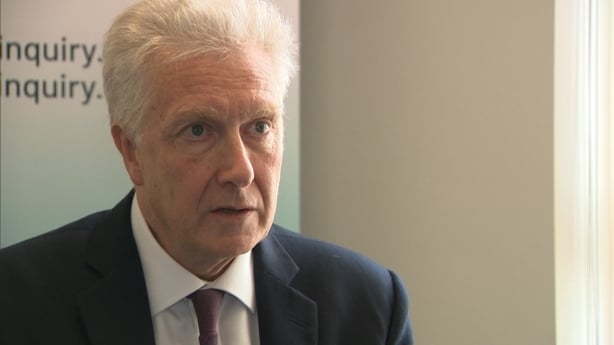The chairperson of a public inquiry into allegations of widespread abuse of vulnerable adults at a hospital in Co Antrim, has said the families of victims must not feel guilty because their loved ones could not tell them about what was happening.
Tom Kark QC said the situation at Muckamore Abbey was unique because many residents were non-verbal, so could not speak about their treatment.
Families sent highly vulnerable people with severe learning difficulties and mental health problems to a place where they thought they would be safe.
But some of those in Muckamore Abbey Hospital became the victims of abuse that was only uncovered after the father of one of the residents raised concerns about the treatment of his son.
Glynn Brown's persistence led to a huge ongoing police investigation and now this public inquiry.
We need your consent to load this rte-player contentWe use rte-player to manage extra content that can set cookies on your device and collect data about your activity. Please review their details and accept them to load the content.Manage Preferences
The chairperson of the inquiry panel told RTÉ News the fact that many of the patients could not speak up about their treatment made them particularly vulnerable and left loved ones feeling angry and guilty.
"Muckamore is, in terms of a public inquiry, unique in one way," Mr Kark said.
"I think the particular concern at Muckamore is that it is the nature of the patient. So, either they will have suffered from very often severe learning disability or mental illness and many of them were non-verbal, so they couldn't actually explain what was happening to them.

"That obviously makes them particularly vulnerable. It also I think makes the relatives particularly unhappy, upset, emotional, sometimes feeling guilty because they didn't realise very often what was happening to their relatives.
"And I would like to say this, that the parents and the friends and the loved ones and the relatives shouldn't feel guilty because in any circumstance such as this there's almost always going to be concealment.
"So, the people wouldn't know on the outside what was going on in the inside, but it makes it really important that we investigate it fully."
Public inquiry under way into safeguarding at hospital in Antrim
The chairperson of a public inquiry into allegations of widespread abuse of vulnerable adults at a hospital in Co Antrim has said the families of victims must not feel guilty because their loved ones could not tell them about what was happening | More: https://t.co/TkcceS4s9I pic.twitter.com/bAiy2H488M
— RTÉ News (@rtenews) June 7, 2022
More than 70 staff at the hospital have been put on cautionary suspension, while 34 have been arrested and eight have appeared before the courts as a result of the police investigation.
But the lawyer acting for the inquiry panel stressed that many staff carried out their work with diligence and compassion.
"There are those who have devoted many years of their lives, often in challenging circumstances, to care properly for the patients at Muckamore," said Sean Doran QC.
"It is important that their good work should not be obscured by the unacceptable conduct of others.
"The inquiry will hear accounts of positive experience and negative experience, it will hear stories about care and failings in care."
In the mid-1980s Muckamore had almost 1,500 patients, but the number today is fewer than 60.
The inquiry is examining what happened, how it happened and what can be done to prevent it happening again.
Outlining the terms of reference, Mr Doran today said the inquiry will examine broader issues including management and processes that may have contributed to what happened.
"Looking beyond the conduct of individuals, the panel may wish to address questions such as, was there a culture within the hospital that enabled abuse to go unchallenged?"
The inquiry will hear its first evidence from witnesses later this month and early July before adjourning and resuming hearings in September.







